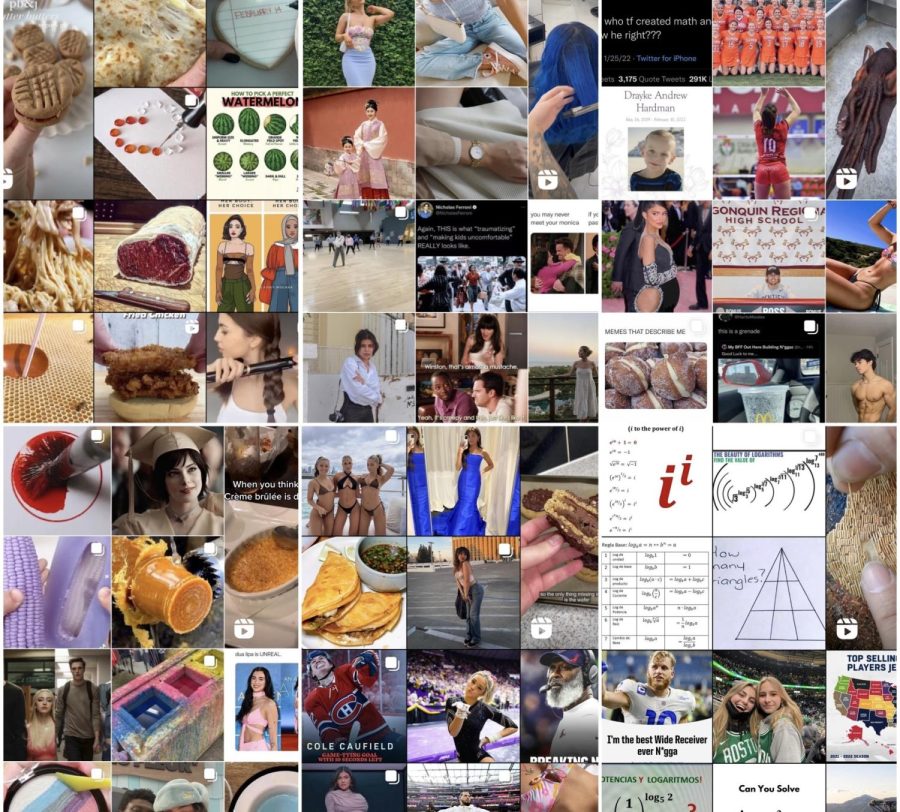Social media impacts body image for many teens
Six students share screenshots of their Instagram Explore pages.
March 1, 2022
Since the pandemic began, phone and social media usage has inevitably increased, making unrealistic beauty standards more accessible to teenagers.
With the uprise in social media use, many students have fallen into the dangerous habit of comparing themselves to others. According to a Harbinger survey of 127 students conducted through Google Forms from Jan. 3 to Jan. 5, 82% percent of respondents say they use social media—specifically, Instagram.
Also from the Harbinger survey, 40% of the respondents’ body images are negatively affected by social media.
“My explore page is mixed with ‘ideal bodies’ as well as eating disorder education, and I tend to feel stuck and lean towards those negative posts more,” one survey respondent wrote.
Avoiding toxicity on social media seems to be an effective mechanism.
“I avoid content that would make me feel self-conscious about myself or that are degrading towards different body types in any way,” another respondent commented.
Health teacher Andrew Kinney believes social media pushes teens to constantly try to obtain what’s on their screen.
“[Instagram pictures] creates a false image, and kids think that it’s attainable, and they think it’s necessary to get to that in order to achieve happiness,” Kinney said.
Though Instagram was still new and “Instagram Models” did not exist when Kinney was in high school, commercials, magazines and the Internet had similar effects on youth around him.
“For me, when I was in high school, the same thing existed where kids would see these people online and say, ‘Oh, this is what I need to achieve,’ and it’s unrealistic a lot of the time,” Kinney said.
Around 2016, Instagram “influencers” became a popular term for people who are also known as “Instagram models.” Most of these influencers are known to be conventionally attractive people who gained many followers by posting pictures of themselves.
A survey of 1,500 people aged from 14 to24 conducted by the Royal Society for Public Health (RSPH) found that “Instagram models” had dangerous effects on Instagram users. Instagram was ranked as the social media network with the most negative impacts on mental well-being.
An anonymous junior who suffered from low body image claims that Instagram “one hundred percent” had the worst effect on her.
One day, she took action into her own hands in order to change her own body.
“I would see how [skinny people] can eat so much because of their metabolism, so I wouldn’t eat because I thought it would change my body,” she said.
The anonymous source sought help through therapy when those around her noticed her sudden weight loss. She recovered swiftly by focusing on herself and working out with the goal to gain muscle. She also made more conscious decisions about her social media use.
“What I did was take social media breaks and wouldn’t go on those apps when it got really bad,” she said.
This issue isn’t solely evident in the run-of-the-mill person; even social media influencers compare themselves and need to take breaks. Social media stars and sisters Charli and Dixie D’Amelio have opened up about their mental health problems on their Hulu show, The D’Amelio Show.
With effective actions like taking breaks when needed and only following beneficial accounts on social media, this surge of dissatisfaction on teenagers can hopefully be reduced.
If you need help with body image issues, guidance counselors and adjustment counselors are always available.










